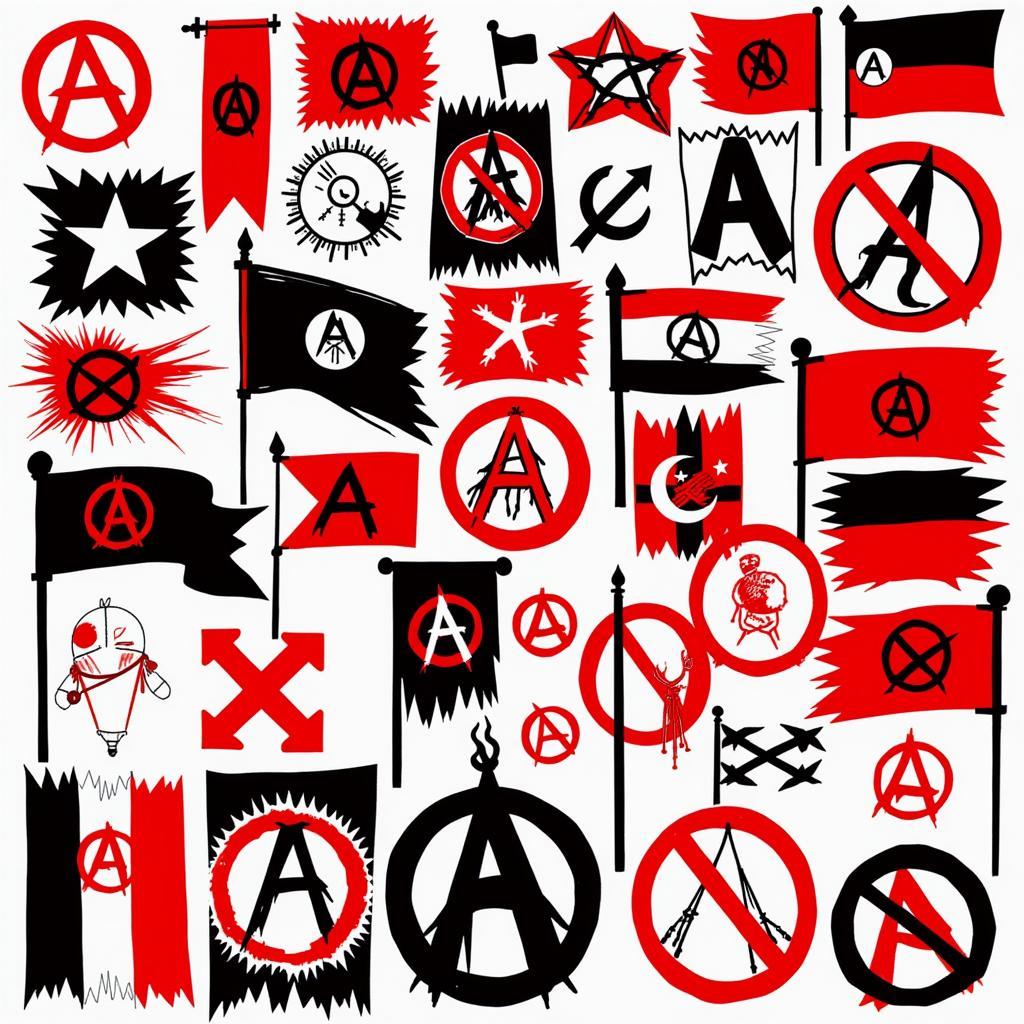The Anarchical Society, often misunderstood, is a complex concept that sparks debate and raises questions about the nature of order and freedom. This article delves into the core principles of anarchism, exploring its various interpretations, historical context, and potential implications for building a more peaceful world.
Exploring the Nuances of an Anarchical Society
Anarchism, at its core, advocates for a society without rulers or hierarchy, emphasizing self-governance and voluntary cooperation. It’s not simply about chaos or the absence of rules; rather, it’s about creating a social order based on mutual respect, individual liberty, and collective responsibility.  Anarchist Symbols and Flags
Anarchist Symbols and Flags
Many associate the anarchical society with violence and disorder, fueled by media portrayals and historical events. However, this perception overlooks the rich philosophical tradition of anarchism, which encompasses diverse perspectives, from pacifist approaches to revolutionary movements. Understanding these nuances is crucial to engaging in meaningful discussions about the anarchical society.
Debunking the Myths Surrounding Anarchy
One common misconception is that an anarchical society equates to a “lawless” society. However, anarchists argue for a system of rules and norms established through consensus and direct democracy, rather than imposed by a centralized authority. They believe that true order arises not from top-down control, but from the bottom-up, through the voluntary cooperation of individuals.
Another myth is that anarchism is inherently violent. While some anarchist movements have engaged in violence, many others advocate for non-violent resistance and social change. Figures like Mahatma Gandhi, with his emphasis on peaceful civil disobedience, demonstrate the potential for non-violent anarchist principles to effect profound social transformation.  Peaceful Protest for Anarchy
Peaceful Protest for Anarchy
The Anarchical Society: A Historical Perspective
The roots of anarchist thought can be traced back to ancient philosophies, but it gained significant traction in the 19th and 20th centuries. Thinkers like Mikhail Bakunin and Peter Kropotkin articulated theories of anarchical communism and mutual aid, emphasizing the importance of community and cooperation in achieving a truly egalitarian society.
Throughout history, various anarchist communities and experiments have emerged, showcasing the practical application of these principles. While some have faced challenges and ultimately dissolved, others have demonstrated the potential for self-governing societies based on mutual respect and shared resources.
What Does an Anarchical Society Mean in the 21st Century?
In today’s interconnected world, the concept of an anarchical society continues to evolve. bull anarchical society The rise of decentralized technologies, like blockchain and cryptocurrencies, has sparked renewed interest in alternative forms of governance and social organization. Some argue that these technologies could facilitate the creation of truly decentralized and autonomous communities.
Moreover, the increasing awareness of social inequalities and the limitations of traditional political systems have led many to re-examine the potential of anarchist principles for addressing contemporary challenges. Issues like climate change, economic disparity, and political corruption have prompted a search for alternative models of social organization that prioritize sustainability, justice, and human well-being.
Conclusion
The anarchical society, far from being a simplistic notion of chaos, represents a complex and multifaceted philosophy with a rich history and continuing relevance. By understanding its core principles and diverse interpretations, we can engage in meaningful dialogue about the potential for creating a more just and peaceful world. bull anarchical society Exploring the anarchical society challenges us to rethink traditional notions of power, order, and freedom, offering valuable insights into alternative ways of organizing ourselves and interacting with each other.
Is an anarchical society possible? While the feasibility of a fully anarchical society remains a topic of debate, exploring its principles can offer valuable lessons for building more equitable and cooperative communities.
What are the different types of anarchism? Anarchism encompasses diverse perspectives, including anarcho-communism, anarcho-syndicalism, and mutualism, each with its own unique approach to social organization.
How does anarchism relate to peace? Many anarchist philosophies advocate for non-violence and peaceful conflict resolution, emphasizing cooperation and mutual respect as pathways to a more harmonious society.
What are some historical examples of anarchist communities? Throughout history, various anarchist communities and experiments have been established, offering insights into the practical application of anarchist principles.
How can I learn more about anarchism? Numerous resources, including books, articles, and online communities, provide opportunities for further exploration of anarchist thought.
What are the criticisms of anarchism? Critics of anarchism often raise concerns about its practicality, potential for instability, and perceived lack of effective governance mechanisms.
How does technology influence anarchist thought? The rise of decentralized technologies has sparked new discussions about the potential for creating more autonomous and self-governing communities.
When you need support, please contact us at Phone Number: 02043854663, Email: [email protected] Or visit us at: Khu 34, Bac Giang, 260000, Vietnam. We have a 24/7 customer support team.